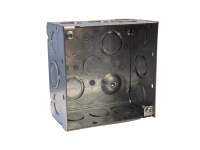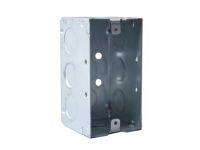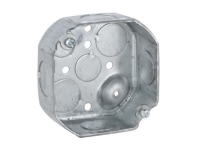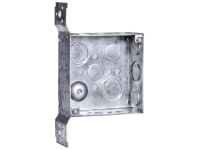Electrical Junction Boxes
Available in Multiples Sizes & Types
Additional Information
Uses & Benifits:
- Housing Electrical Connections: Junction boxes are used to enclose and protect electrical connections, such as splices and wire terminations, ensuring that they remain safe and secure.
- Mounting Electrical Devices: They serve as a base for mounting electrical devices like switches, outlets, and fixtures, providing a secure and accessible point for these installations.
- Cable Management: Junction boxes help organize and route electrical cables, preventing tangling and reducing the risk of damage.
- Conduit Entry and Exit: They act as connection points for conduit systems, allowing wires to enter and exit safely while maintaining electrical integrity.
- Safety: Junction boxes protect electrical connections from dust, moisture, and accidental contact, reducing the risk of electrical fires, short circuits, and shocks.
- Accessibility: They provide easy access to electrical connections for maintenance, inspection, and troubleshooting, making it easier to repair or upgrade systems.
- Compliance with Codes: Using junction boxes ensures compliance with electrical codes and standards, which often require that all wire splices and connections be contained within an enclosure.
- Organization: Junction boxes help organize and route wires, reducing clutter and making the electrical system more manageable.
- Durability: Made from materials like metal or plastic, junction boxes are durable and can withstand environmental stresses, providing long-term protection for electrical systems.
- Versatility: Available in various shapes, sizes, and configurations, junction boxes can accommodate different types of electrical installations and applications.
Applications of Junction Boxes:
- Residential Buildings: Used in homes for managing wiring connections for lights, switches, outlets, and other electrical devices.
- Commercial and Industrial Buildings: In larger buildings, junction boxes are essential for managing complex electrical systems, including lighting, HVAC, and machinery connections.
- Outdoor Installations: Weatherproof junction boxes are used in outdoor applications to protect electrical connections from the elements, such as in garden lighting, outdoor outlets, and security systems.
- Ceiling and Wall Installations: In both residential and commercial settings, junction boxes are used to mount light fixtures, ceiling fans, and wall-mounted devices.
- Retrofit Projects: Junction boxes are commonly used in renovation and retrofit projects to modify or extend existing electrical systems safely.
- Temporary Installations: Junction boxes are also used in temporary installations, such as construction sites, to provide safe and accessible connections during the project.
Junction boxes are essential components in electrical systems, designed to house and protect wire connections, ensuring safety and organization. They provide a secure base for mounting devices like switches and outlets while offering easy access for maintenance and upgrades. Made from durable materials like metal or plastic, junction boxes shield connections from environmental factors, reducing the risk of electrical hazards. Whether in residential, commercial, or industrial settings, junction boxes are vital for managing complex wiring systems, ensuring compliance with electrical codes, and promoting long-term reliability.
In summary, junction boxes are critical components in electrical systems, offering safety, organization, and accessibility. They are used across a wide range of applications, from simple residential wiring to complex commercial and industrial electrical systems.






